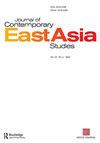Japan’s policy on North Korea: four motives and three factors
IF 1.4
Q1 AREA STUDIES
引用次数: 1
Abstract
ABSTRACT Background The central model of Japan’s North Korea policy has been maintained consistently despite repeated changes in the government from the Liberal Democratic Party to the Democratic Party and back again.Purpose: This paper summarizes Japan’s policy concerning North Korea after the Cold War, examines the structure of this policy, and, based on this structure, analyzes Japan’s current policy regarding North Korea. The analysis then turns to the future.Main Argument: Normalizing relations between Japan and North Korea may be the primary goal of Japan’s policy, but the following four motives can also be identified. First, for Japan, the normalization of relations with North Korea is significant as a remaining postwar process. The second motive involves responses to security issues. Third, there is the issue of the safety of Japanese lives. Fourth, Japan’s economic opportunities in North Korea must be considered. Japan has sought ties with North Korea with these four motives, which will remain unchanged in the future. However, Japan does not aim to normalize relations with North Korea without restrictions, and Japan’s policy concerning North Korea is bound by the following three factors. The first factor is the international environment. Second, Japan–North Korea relations are constrained by the attitude of South Korea. Third, Japan’s domestic politics also determine Japan’s North Korea policy.Conclusion: While the four motives will remain the same for Japan, these three factors determine Japan’s attitude toward North Korea, all three of which are pushing for Japan to negotiate with North Korea. He central model of Japan’s North Korea policy has been maintained consistently despite repeated changes in the government from the Liberal Democratic Party to the Democratic Party and back again. This paper summarizes Japan’s policy concerning North Korea after the Cold War, examines the structure of this policy, and, based on this structure, analyzes Japan’s current policy regarding North Korea. The analysis then turns to the future. Normalizing relations between Japan and North Korea may be the primary goal of Japan’s policy, but the following four motives can also be identified. First, for Japan, the normalization of relations with North Korea is significant as a remaining postwar process. The second motive involves responses to security issues. Third, there is the issue of the safety of Japanese lives. Fourth, Japan’s economic opportunities in North Korea must be considered. Japan has sought ties with North Korea with these four motives, which will remain unchanged in the future. However, Japan does not aim to normalize relations with North Korea without restrictions, and Japan’s policy concerning North Korea is bound by the following three factors. The first factor is the international environment. Second, Japan–North Korea relations are constrained by the attitude of South Korea. Third, Japan’s domestic politics also determine Japan’s North Korea policy. While the four motives will remain the same for Japan, these three factors determine Japan’s attitude toward North Korea, all three of which are pushing for Japan to negotiate with North Korea.日本的对朝政策:四个动机和三个因素
背景日本对朝政策的核心模式一直保持不变,尽管日本政府从自民党到民主党反复更迭。目的:本文总结了冷战后日本的对朝政策,考察了这一政策的结构,并在此基础上分析了日本当前的对朝政策。然后,分析转向未来。主要论点:日本与朝鲜关系正常化可能是日本政策的首要目标,但也可以确定以下四个动机。首先,对日本来说,与朝鲜关系正常化是战后遗留下来的重要进程。第二个动机涉及对安全问题的回应。第三,日本人的生命安全问题。第四,必须考虑日本在朝鲜的经济机会。日本以这四个动机寻求与北韩的关系,今后也不会改变。但是,日本并不打算无限制地实现对朝关系正常化,日本的对朝政策受到以下三个因素的制约。第一个因素是国际环境。第二,日朝关系受到韩国态度的制约。第三,日本的国内政治也决定了日本的对朝政策。结论:虽然这四个动机对日本来说将保持不变,但这三个因素决定了日本对朝鲜的态度,这三个因素都在推动日本与朝鲜谈判。日本对北韩政策的核心模式,虽然经历了自民党和民主党的交替,但始终没有改变。本文总结了冷战后日本的对朝政策,考察了这一政策的结构,并以此为基础分析了日本目前的对朝政策。然后,分析转向未来。日本与朝鲜关系正常化可能是日本政策的首要目标,但也可以确定以下四个动机。首先,对日本来说,与朝鲜关系正常化是战后遗留下来的重要进程。第二个动机涉及对安全问题的回应。第三,日本人的生命安全问题。第四,必须考虑日本在朝鲜的经济机会。日本以这四个动机寻求与北韩的关系,今后也不会改变。但是,日本并不打算无限制地实现对朝关系正常化,日本的对朝政策受到以下三个因素的制约。第一个因素是国际环境。第二,日朝关系受到韩国态度的制约。第三,日本的国内政治也决定了日本的对朝政策。对日本来说,这四个动机将保持不变,但这三个因素决定了日本对北韩的态度,这三个因素都在推动日本与北韩进行谈判。
本文章由计算机程序翻译,如有差异,请以英文原文为准。
求助全文
约1分钟内获得全文
求助全文
来源期刊

Journal of Contemporary East Asia Studies
Social Sciences-Cultural Studies
CiteScore
2.50
自引率
0.00%
发文量
10
审稿时长
6 weeks
 求助内容:
求助内容: 应助结果提醒方式:
应助结果提醒方式:


